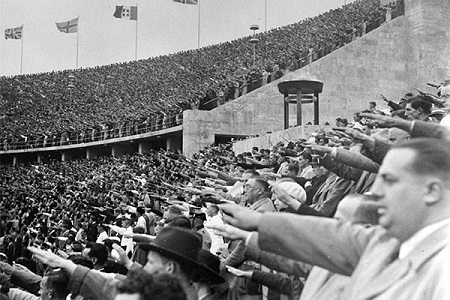
The 1936 Summer Olympics (Games of the XI Olympiad) were held in 1936 in Berlin, which beat Barcelona to host the Games on 26 April 1931, two years before the Nazis came to power. In order to outdo the 1932 Los Angeles games, Germany constructed a 100,000-seat track and field stadium, six gymnasiums, and many other smaller venues. These were the first games ever to be televised, and radio coverage broadcast to 41 countries. Hitler's favourite film maker, Leni Riefenstahl, was commissioned to film the Games. The result, Olympia, was pioneering in the techniques now common when filming sports.
Hitler saw the Games as an opportunity to promote his ideals of racial supremacy, with the official Nazi party paper, the Völkischer Beobachter, stating in the strongest terms that Jews should not be allowed to participate in the Games. Following a threatened boycott of the Games by other nations, this was a position from which the Nazis were forced to back down.

The games raised $7.5 million Reichsmark though ticket sales, generating a profit (by means of creative accountancy) of over one million marks. This was achieved because the official budget did not include the 16.5 million marks spent by the city of Berlin, or indeed the monies spent by the national government which is estimated to have been in the order of $30 million. Germany was the most successful competing nation, winning 89 medals; the United States came second with 56.
As well as being the first games ever televised, the Nazis invented the torch run from ancient Olympia to the host city, although the Olympic flame had been first introduced at the 1928 Amsterdam games. A total of 49 nations participated in the Berlin Olympics, up from 37 in 1932.
 Shown here are two images of items in our collection from the 1936 Berlin Olympics. The most striking aspect is that the State has completely overtaken the games by implanting the swastika on both items. The bottom photograph shows a beer mat and the top picture is of a souvenir badge, which was sold in Berlin at the time.
Shown here are two images of items in our collection from the 1936 Berlin Olympics. The most striking aspect is that the State has completely overtaken the games by implanting the swastika on both items. The bottom photograph shows a beer mat and the top picture is of a souvenir badge, which was sold in Berlin at the time.Back
